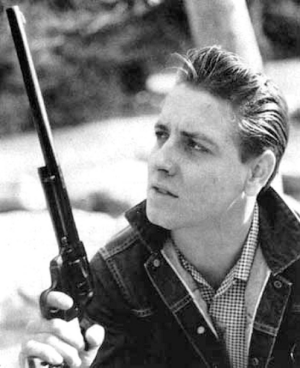Eddie Cochran

Well, I'm a-gonna raise a fuss / I'm a-gonna raise a holler / About working all summer / Just a-trying to earn a dollar—"Summertime Blues"
Ray Edward "Eddie" Cochran (October 3, 1938 – April 17, 1960) was an American singer, songwriter and guitarist. He is considered one of the most influential Rock and Roll artists of the late '50s alongside Buddy Holly and Elvis Presley, among others. Of particular note was his skillful guitar playing, and his pioneering use of studio techniques such as overdubbing. Lyrically, Cochran's material was typically more rebellious than his contemporaries; his most well-known songs typically deal with problematic teenage love, and the acceptance (or rejection) of the responsibilities of adulthood. Cochran was killed in an automobile accident in 1960; his co-passengers, artistic colleague Gene Vincent and Cochran's fiancee Sharon Sheeley, survived.
Often attributed to the briefness of his career and his small number of chart hits, Cochran is not as well remembered as his contemporaries. Nevertheless, Cochran had a profound influence on some of the greatest artists of the 60s such as The Beatles, The Rolling Stones, and The Who; indeed, Cochran's "Twenty Flight Rock" was the very song a young Paul McCartney played for John Lennon to audition for his first group, The Quarrymen. His rough, bass-driven singles such as "Summmertime Blues", "C'mon Everybody", and "Somethin' Else", are often cited as being a heavy influence on punk music, leading certain punk luminaries to dub Cochran the "Grandfather of Punk Rock".
- And That Little Girl Was Me: "Boll Weevil Song":
"Well, if anybody should ask ya / who it was who sang this song / say a guitar picker from Oklahoma City / with a pair of blue jeans on / Just lookin' for a home..."
- Author Existence Failure
- Band of Relatives: Subverted; although Eddie was one half of The Cochran Brothers early in his career, his partner Hank Cochran was not actually related.
- Bo Diddley Beat: The chorus of "Weekend".
- Break Up Song
- Call-and-Response Song: The backing vocals of "Teresa" are effectively this.
- Cool Car: One of the things the subject of "Somethin' Else" works hard to obtain.
- Continuity Nod: "Nervous Breakdown" contains the words "no more runnin' 'round with the usual crew", which were also heard in his earlier single, "C'mon Everybody".
- Creator Couple: A rare example with two males exists. Cochran frequently composed his songs together with Jerry Capeheart, who was also his manager.
- Cover Version: Several, most of which are now (and probably even then) considered the canon standards of rock & roll, including "Blue Suede Shoes", "Long Tall Sally", and "Milk Cow Blues".
- Downer Ending: "Twenty Flight Rock", maybe:
"All this climbing is getting me down / they'll find my corpse draped over a rail / But I climbed one, two flight, three flight, four..."
- Flanderization: His reputation as an "Elvis soundalike" is somewhat unjustly exaggerated; in fact, a majority of Eddie's catalog (certainly most of most well-known hits) consisted of rough rock numbers, in which his voice was decidedly his own.
- The Fifties: Ayup.
- Greatest Hits Album: Too many to list. A notable one is The Eddie Cochran Memorial Album, originally a collection of twelve hits released shortly before his death, re-purposed (with only the album cover being moderately changed) as a posthumous collection after the tragedy.
- Grief Song: "Three Stars", a tribute to Buddy Holly, Ritchie Valens, and J.P. "The Big Bopper" Richardson and the infamous "Day the Music Died,". Cochran's voice audibly cracks at several points in the song. What's worse, the poor guy had do record several takes...
- I Am the Band: Cochran was seldom depicted together with any of his band members in press photos or album covers.
- Instrumentals: "Chicken Shot Blues", "Guybo" (named after a bandmate), and "Jam Sandwich", alongside a few others.
- Last-Note Nightmare: The loud, echoing popping noise Eddie makes with his lips at the end of "Sittin' in the Balcony".
- List Song: "Twenty Flight Rock", which follows Eddie's ascent of a twenty-floor apartment, step by step. But when he gets to the top, he's too tired to rock...
- Misogyny Song: "My Way" (not that one) is about some unlucky woman's control-freak boyfriend.
- Music of Note: Not really as much to the general listening audience, but he certainly was this to some of the greatest bands of The Sixties.
- The Nicknamer: Cochran was known for this. He called his mother "Shrimper" in reference to her height. Musicians Bob Denton and Richard Rae were "the Brew Brothers" (they always had a beer in their hands). The road manager for Eddie's and Gene Vincent's UK tour, Hal Carter, was "Boody" for how Carter pronounced "buddy". Not sure if it was true that he actually called songwriter (and fiancee) Sharon Sheeley "Charlie Brown" or why.
- Non-Appearing Title: "Twenty Flight Rock".
- One-Woman Song: "Teresa".
- Sanity Slippage Song: "Nervous Breakdown".
- Signature Song: "Summertime Blues" and "C'mon Everybody".
- Silly Love Songs: Several, perhaps his most-out-and-out "silly" song was the ukulele-driven "Drive-in Show", with "Three Steps to Heaven" as a close second. But as mentioned before, a majority of Cochran's love songs were less idealistic.
- Singer Namedrop: Cochran had a tendency to insert his own name into songs, even covers such as "Hallelujah, I Love Her So".
- Something Blues: Naturally, his biggest hit "Summertime Blues", but also "Chicken Shot Blues", "Eddie's Blues", and "Rock 'n' Roll Blues".
- Spoken Word in Music: The verses of "Three Stars" are more like eulogies than song in this respect.
- "I Want" Song: "Teenage Heaven".
- Three Chords and the Truth: Oh, hell yes.
- Title-Only Chorus: "C'mon Everybody" (unless an introductory "Ooh" qualifies; it can also be argued that the Epic Riff is the real chorus of the song).